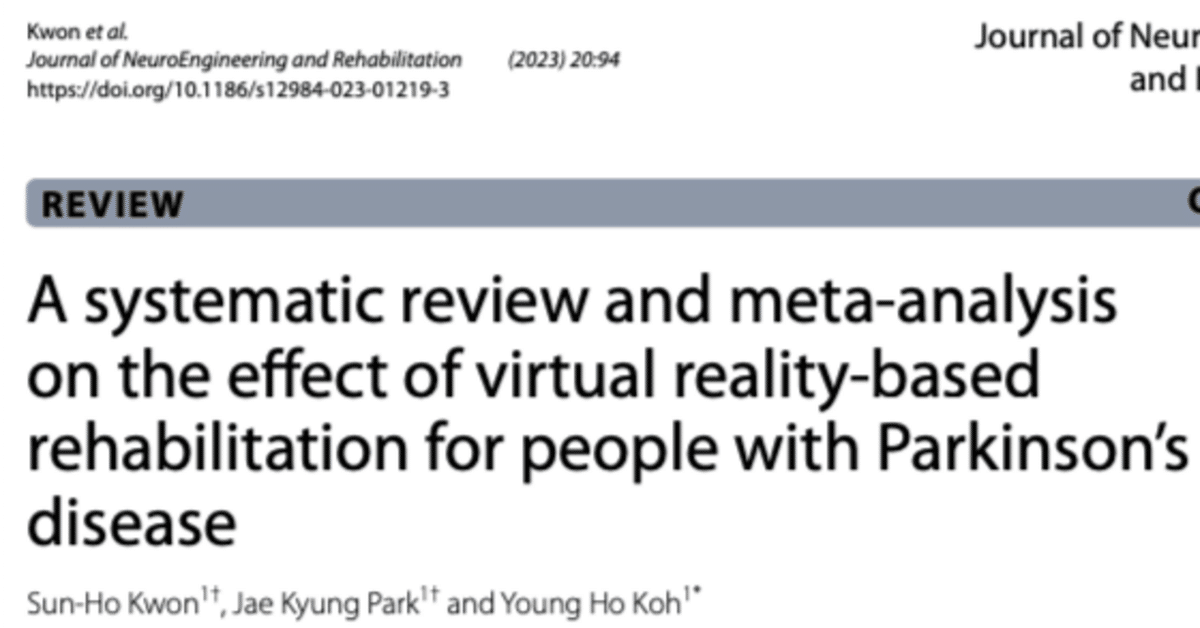
パーキンソン病に対するVRの効果,システマティックレビューandメタアナライシス
DOI https://doi.org/10.1186/s12984-023-01219-3
パーキンソン病に対するVRは現時点では部分的な効果しか示されなかった.効果が示されたのは,バランス練習のみ.その他ADLやQOLでは有意な変化は見られなかった.

Background
Virtual reality (VR) is a promising solution for individuals with Parkinson’s disease (PD) who experience symptoms that affect their daily activities and independence. Through VR-based rehabilitation, patients can improve their motor skills in a safe and stress-free environment, making it an attractive alternative to traditional in-person rehabilitation during the COVID-19 pandemic. This study aimed to provide the most recent and convincing evidence on the rehabilitative effects of VR technology compared with conventional treatments.
背景
バーチャルリアリティ(VR)は、日常生活や自立に影響を及ぼす症状を経験するパーキンソン病(PD)患者にとって有望な解決策である。VRを用いたリハビリテーションにより、患者は安全でストレスのない環境で運動技能を向上させることができ、COVID-19の流行期に従来の対面リハビリテーションに代わる魅力的な選択肢となる。本研究では、従来の治療法と比較したVR技術のリハビリテーション効果について、最新の説得力のあるエビデンスを提供することを目的とした。
Methods
Two investigators systematically searched Embase, MEDLINE, CINAHL, PEDro, and the Cochrane Library from their inception until May 31, 2022, to identify randomized controlled trials (RCTs) comparing the effectiveness of VR training with that of conventional treatment for patients with PD. Studies were selected based on the patient, intervention, comparator, and outcome criteria and assessed for the risk of bias using the Cochrane tool. Meta-analysis was conducted by pooling mean differences with 95% confidence intervals.
方法
2名の研究者が、Embase、MEDLINE、CINAHL、PEDro、Cochrane Libraryを開始から2022年5月31日まで体系的に検索し、PD患者に対するVRトレーニングと従来の治療の有効性を比較したランダム化比較試験(RCT)を同定した。患者、介入、比較対象、アウトカムの基準に基づいて研究を選択し、Cochraneツールを用いてバイアスのリスクを評価した。メタアナリシスは、平均差を95%信頼区間とともにプールすることにより実施した。
Results
A total of 14 RCTs, involving 524 participants, were included in the meta-analysis. The results indicated that VR-based rehabilitation significantly improved balance function, as measured using the Berg balance scale (BBS) and activities-specific balance confidence. However, no statistically significant differences in gait ability, activities of daily living, motor function, and quality of life were observed between the experimental and control groups. Subgroup analysis revealed that combination therapy affected heterogeneity in the BBS analysis. Meta-regression analysis demonstrated a significant positive relationship, indicating that more recent studies have shown greater improvements in balance function.
結果
524人が参加した合計14のRCTがメタ解析に含まれた。その結果、VRを用いたリハビリテーションは、Berg balance scale(BBS)および活動特異的バランス信頼度を用いて測定したバランス機能を有意に改善することが示された。しかし、歩行能力、日常生活動作、運動機能、QOLについては、実験群と対照群で統計学的に有意な差は認められなかった。サブグループ解析により、併用療法がBBS解析における異質性に影響を及ぼすことが明らかになった。メタ回帰分析では有意な正の関係が示され、より最近の研究でバランス機能の改善がより大きいことが示された。
Conclusion
This study’s findings suggest that VR-based rehabilitation is a promising intervention for improving balance function in patients for PD compared with conventional treatment, and recent research supports its efficacy. However, future research should focus on conducting long-term follow-up studies and developing standardized protocols to comprehensively establish this intervention’s potential benefits.
結論
本研究の結果から、VRを用いたリハビリテーションは、従来の治療と比較してPD患者のバランス機能を改善するための有望な介入であり、最近の研究でもその有効性が支持されていることが示唆された。しかし、今後の研究では、この介入の潜在的な有益性を包括的に確立するために、長期追跡研究の実施と標準化されたプロトコルの開発に焦点を当てるべきである。
この記事が気に入ったらサポートをしてみませんか?
